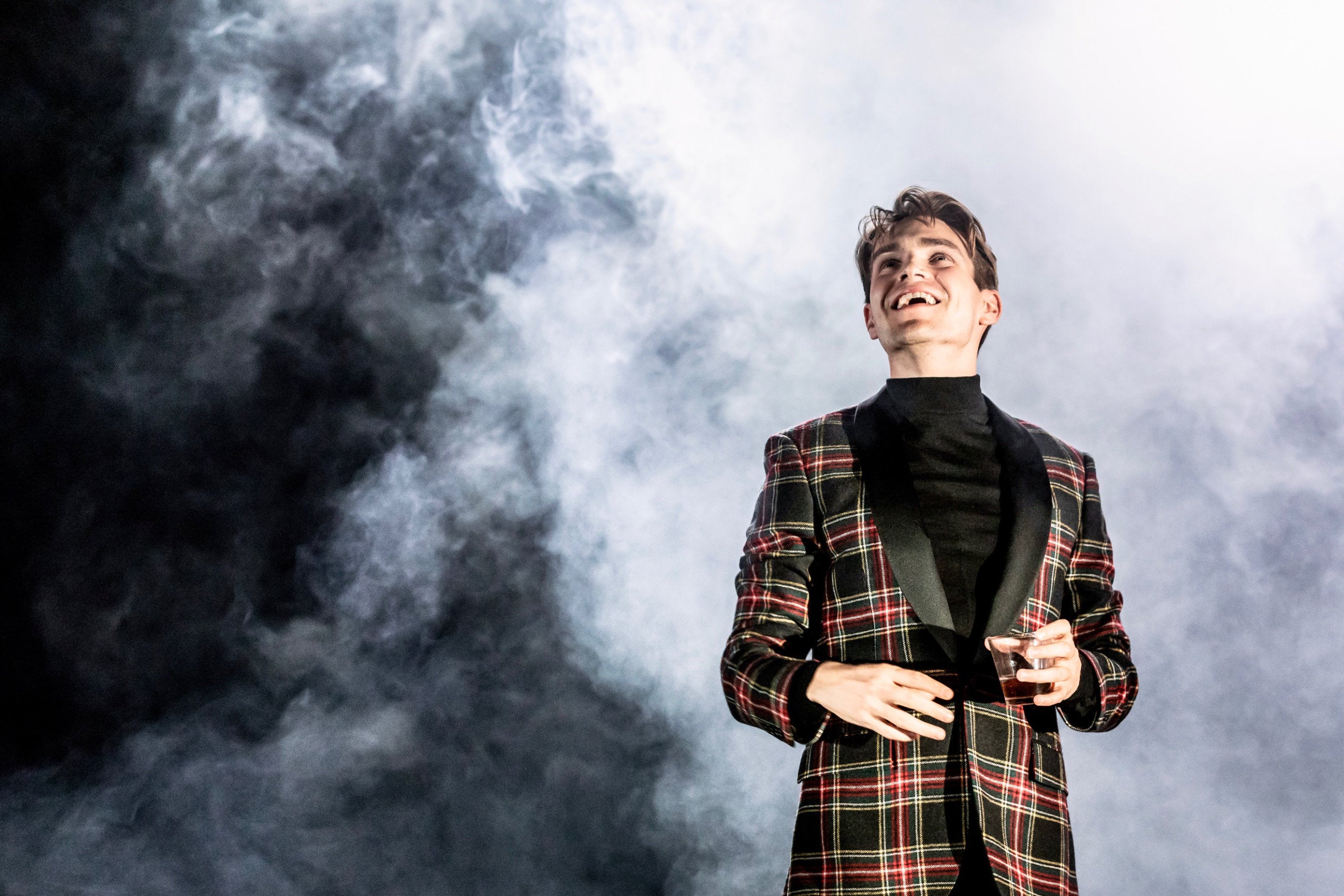
A Portrait of the Artist as a Young Man
He’s acted with Vanessa Redgrave in London’s hottest play The Inheritance. The New York Times says he’s an actor to watch. And Broadway.com gushes that he “burns with a bulb-shattering voltage.”
For Andrew Burnap, though, real success is seeing an audience moved by a story well told.
Much Ado About Nothing. The Robert E. Will Theater, 2013. Andrew Burnap ’13 as Benedict. Olivia Khoshatefeh ’13 as Beatrice. Offstage, Burnap’s nose is bleeding. Onstage, Olivia shoots him an I-am-so-not-going-to-kiss-your-bloody-face look.
It was the pivotal moment in Much Ado About Nothing: Bickering leads Beatrice and Benedick to share their first kiss.
But this night, Shakespeare’s comedy was careening toward tragedy.
“His whole face was bloody,” Khoshatefeh recalls. She watched Burnap vainly try to stop the blood flow, which only made more of a mess. Time was up.
“He came onstage, put his hand over my mouth, and kissed his hand. It went with the show because Beatrice and Benedick spend the whole play bickering. It was such a great moment: beautiful and kind of perfect,” Khoshatefeh says. “It showed how well he knew his character.”
Burnap laughs at the memory. “I had to do something,” he says. “There’s no improvising Shakespeare.
“And when something is undeniably real, it sparks new life into the story. The audience is sitting forward and participating in the magic of live performance. I panicked for a moment, but for everyone else, it was a beautiful mess.”
At 27, Andrew Burnap has had more than a few beautiful moments: a stellar undergraduate career at URI, graduating first in his class from Yale School of Drama, making his professional debut as Troilus in Troilus and Cressida in Central Park’s Delacorte Theater. And now he’s one of the youngest actors to have starred in Matthew Lopez’s The Inheritance at the Noël Coward Theatre in London after a sold-out, critically acclaimed run at the Young Vic.
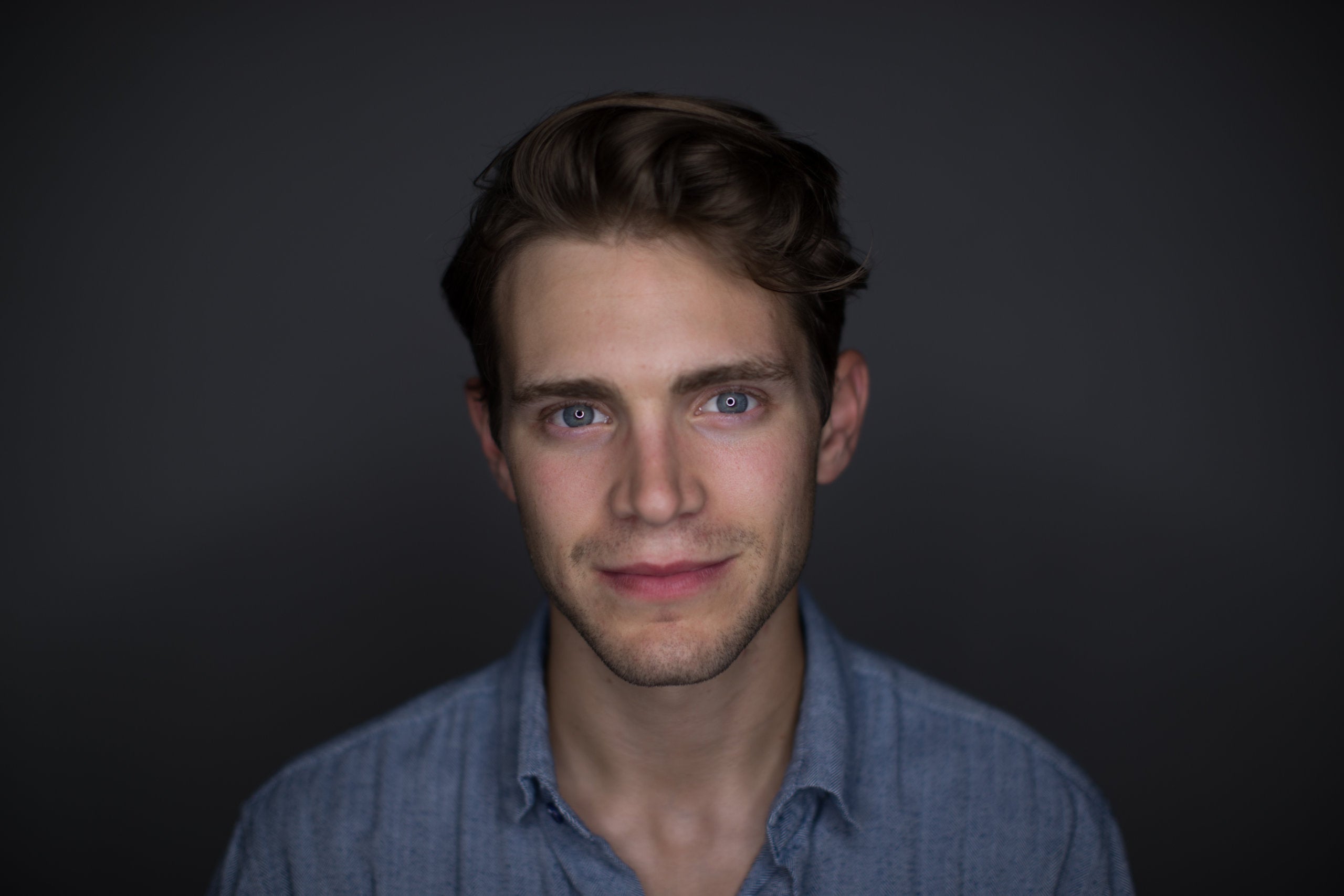
Tony Award-winner Stephen Daldry directed this epic, seven-hour play about gay men living in New York City a generation after the AIDS crisis. Burnap played Toby Darling — a name almost too perfect for those who know him well. They use words like “intoxicating,” “magical,” and “shiny” to describe him. Friend Sam Gross, who saw him in The Inheritance, has an awed-but-not-surprised response to his success. “The Inheritance is one of the most emotional things I’ve ever experienced,” he says. “People were crying. People were stunned at intermission. It’s incredible seeing him in the roles he plays and to think that’s the same guy I grew up with.
“He fills every stage,” Gross says. “He’s outstanding in every setting.”
Burnap appreciates accolades but, when asked about his idea of success, doesn’t talk about seeing his name on a Broadway marquee or starring in a Marvel Comics movie. “To me, making it is when others in your field come to see your work,” he says. “My goal in life is to tell the stories I want to tell, to be with the people I want to be with, to have a life and a family and to walk down the street unnoticed.
“Theater gives me the opportunity to understand what it means to be human — flawed, a walking contradiction,” Burnap says. “I get to celebrate the beauty and the horrors of this life.
“And I’ve learned that love is the greatest thing life has to offer.”
The Rocky Horror Picture Show. J Studio, 2010. Burnap as Dr. Frank-N-Furter in black leather corset, fishnet stockings, and 6-inch heels belting out “Sweet Transvestite.”
Allison Burnap will tell you her son started performing early.
“We’d play this mishmash of Christmas songs and, all of a sudden, he’d stop in his tracks and this thing took over: He’d go into a trance,” she recalls, laughing. He was 5, maybe 6. “That Christmas he asked for a top hat and cane.”
Things got serious his sophomore year at URI, Burnap’s parents say, with Rocky Horror.
“It was the start of feeling like I could do this,” Burnap says. “Doctor Frank-N-Furter came to me surprisingly naturally. It opened up a whole new world within my own person.”
“After Rocky Horror and Singin’ in the Rain, I knew that he had the talent to do anything,” says his father, Tim.
Best friend and neighbor Austin Madden remembers the day his mother called to say she’d seen Burnap walking the neighborhood in 6-inch heels, practicing for the role. While amusing, it wasn’t surprising. Burnap was always practicing. “He’d always be in the basement playing piano or practicing accents,” Madden recalls.
“I saw him in Rocky Horror. To see him in these big roles. Oh, my God. That’s my best friend playing a transvestite, playing a drag queen. He’s amazing.”
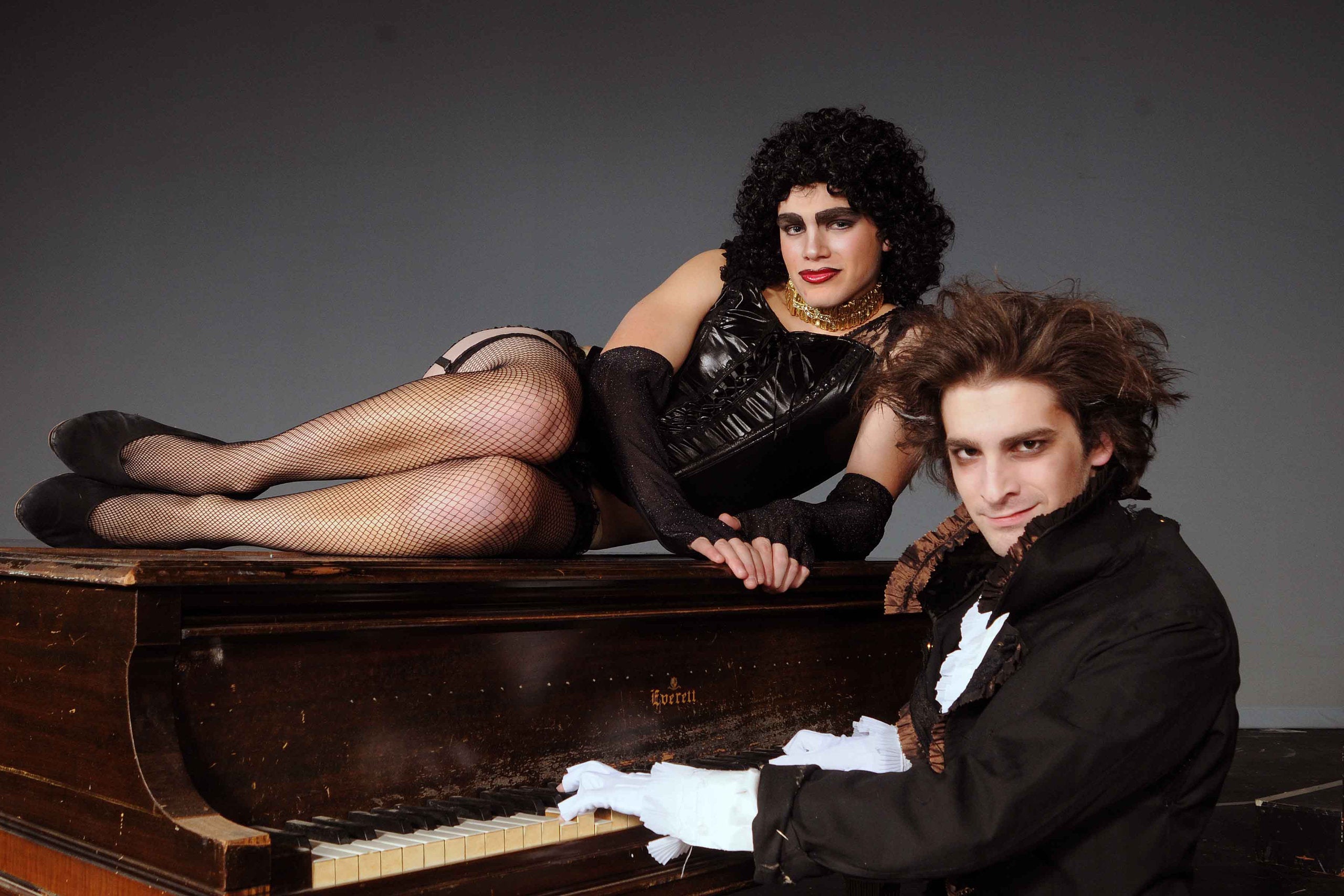
Rocky Horror required Lady Gaga-esque command of platform heels. Singin’ in the Rain called for dancing on a slick stage. Burnap did not come by either skill naturally. Hard work underpinned those seamless performances.
“You can practice walking in heels or tap-dancing six hours a day. That’s muscle memory. By the time you’re onstage, it doesn’t feel like effort,” Burnap says. “In Singin’ in the Rain, Gene Kelly’s dancing is gorgeous because it’s effortless. And you’re just as impressed with what he’s doing as you are with the fact that he makes it look easy.
“It’s transcendent,” Burnap says. “And you can feel it.”
Paula McGlasson directed him in both shows.
“The ‘It’ factor — he had it,” McGlasson says. “He exuded sincerity, confidence, great comic timing, and that great thing you can’t teach: charisma. He was someone you wanted to watch,” she recalls.
URI Theatre Department Chair David Howard was Burnap’s first-year advisor. “It really was Rocky Horror that solidified him in people’s minds,” Howard says. “Doctor Frank-N-Furter is the exact opposite of how I perceive Andrew. He completely embraced the whimsy and the depravity of the role. It felt mature and knowing.
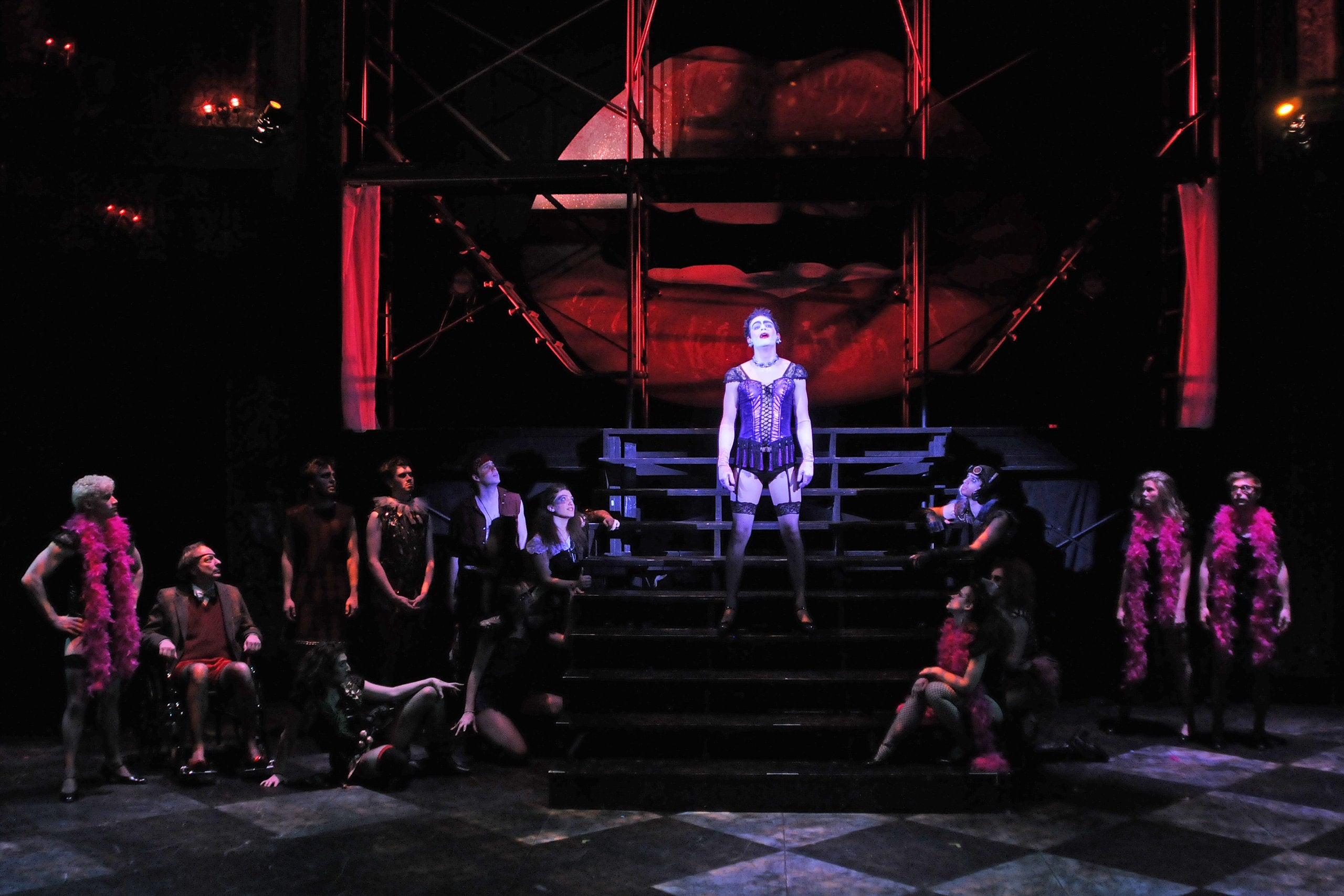
“Andrew is incredibly reserved, humble, gracious, and inclined to underplay his place in the world,” Howard continues. “That he can transform into a character who is braggadocious and loud and extravagant shows that he has the ability to plumb the depths of a character.”
Tony Estrella ’93, Burnap’s Shakespeare teacher at URI, smiles to hear of his Much Ado About Nothing mishap. “It is tough to improvise in iambic pentameter,” he notes. “And you don’t want to break the bond with the audience. It’s a testament to his ability, to his investment in the character, and to keeping the story moving forward.”
Estrella is disinclined to take credit for the younger actor’s success. Burnap entered URI already almost fully formed as an actor, Estrella says. “I saw him in Two Gentlemen of Verona, a jukebox musical version, and there he was playing the trumpet live in front of 4,000 people on the Common in Boston, and I’m like, ‘Jesus, what else does he have in his toolbox?’”
New Haven, Connecticut, Yale University, 149 York St., January 2013. Three small studios and a communal sitting area offer no privacy. Students await their auditions to the Yale School of Drama. Some shake their hands, some text. Everybody’s got headphones in.
“I’d prepared four monologues. I was so unbelievably nervous,” Burnap recalls. “I entered this room and there was this big bear-like man with a deep voice, Walton Wilson, and a thin, elegant, Fred Astaire-type older man, Ron Van Lieu.
“They told us, ‘Don’t worry. We want you to be good. Just do your pieces as you want to do them, and everything will work out.’”
Burnap first auditioned for Wilson. After each monologue, Wilson said, “Great, do you have anything else you’ve prepared for us?”
Then, a return to the waiting room for what seemed hours. Finally, a Yale student bearing the list arrived and said, “If your name’s on the list, stay. If not, thank you; nothing more is required of you,” Burnap recalls. “I was always the last person to look at the lists. I sort of gingerly walked over and saw my name and was like, ‘Holy shit!’ I took a picture. I still have the picture of the list on my phone.”
Burnap’s name was one of only four. Thirty had auditioned. That year, 1,200 aspiring students would audition for 16 slots.
The second audition came and went. Then there were three. Burnap got the nod for callback weekend, a two-day assessment of getting-to-know-you events and more auditions.
The last interview had the feeling of the final scene in Flashdance: Burnap alone with a panel of five judges. He joked with them, got a few laughs. “I was self-deprecating, made fun of myself and Yale. I left happy, on the lighter side of things,” he recalls.
The three actors who followed Burnap left the interview crying. “Then I thought, I should have cried. Why did I tell stupid jokes? What was I thinking?
“In short, I had a meaningless freak-out.”
Ron Van Lieu laughs at Burnap’s recollection. “When they enter the room, you try to diffuse their anxiety, tension, and stress,” he says. “What they don’t realize is that the person on the other side of the desk wants the same outcome they do.”
“He had a charismatic presence that is not teachable,” Van Lieu says of Burnap. “Evaluating students you’re thinking, do you really want to watch him? Do you miss him when he leaves the stage? How capable is he of holding your attention?”
Yes. Yes. And yes, thought Van Lieu, watching the younger man audition. The professor saw some other things, too. “He didn’t know the difference between performing and acting. His auditions were a little show-offy. You know, though, that that’s just a cover for his anxiety.”
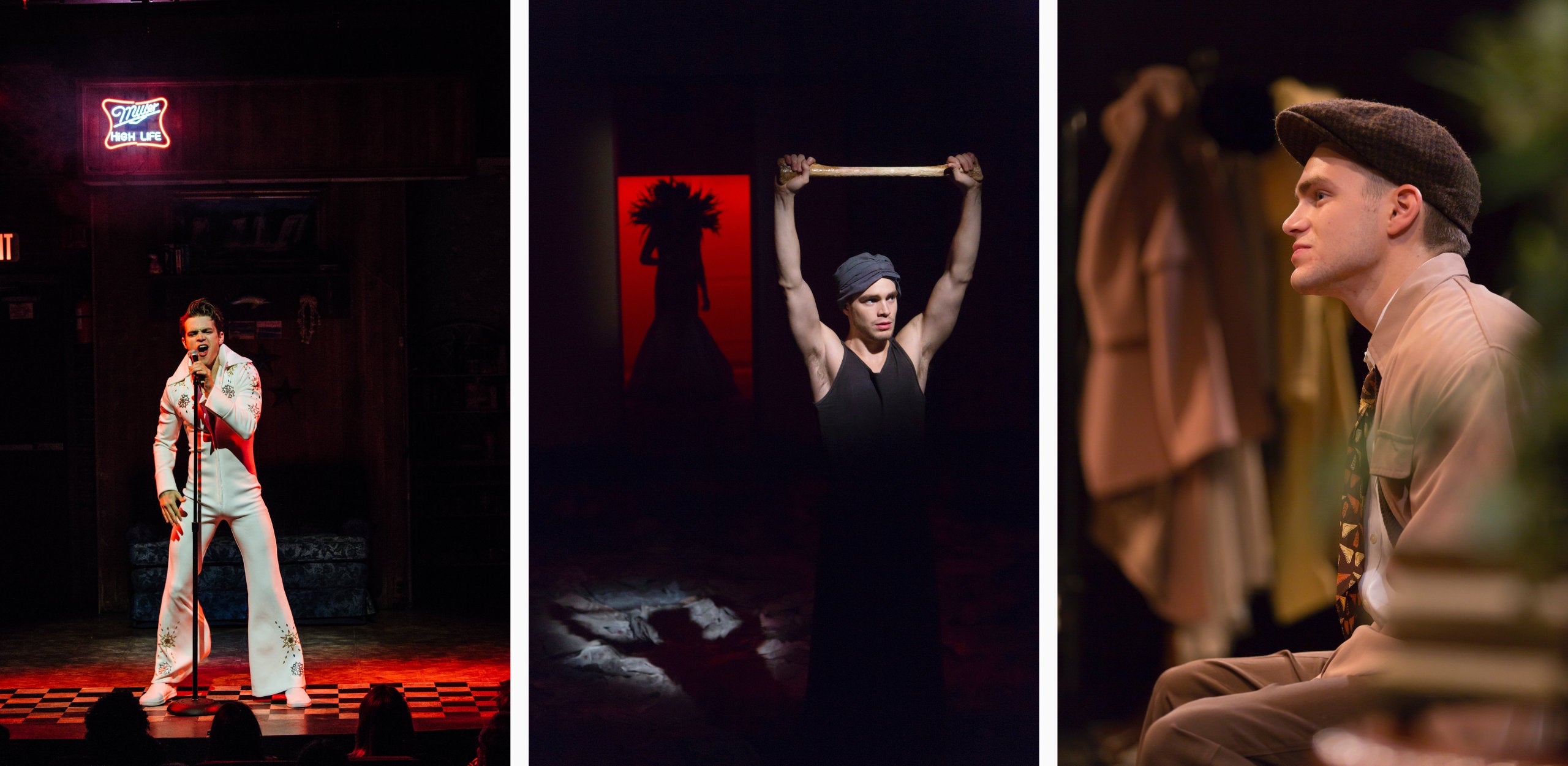
Van Lieu’s assessment was spot-on. Anxiety and depression nearly derailed Burnap in his first semester at Yale.
“My family has a very strong line of depression running through it,” Burnap says. “I started to battle depression at an early age, and it took ahold of me and became full-on depression in my freshman year at college. I started taking medication.
“And at that point, I had no interest in understanding it. It wasn’t until I got to Yale that I wanted to understand this part of me,” he continues. “I started to see it as a connection to a part of my life.”
With his parents’ and Yale’s knowledge, Burnap weaned off of his medication. “I felt medication didn’t let me feel the emotional lows or the emotional highs. I wanted to be in that emotional place that a character has no choice but to be in.
“At URI, I felt I had this remarkable thing inside of me, a sense of confidence and knowledge. At Yale, I lost the feeling of being remarkable and it allowed me to work from a place of humility. I was watching classmates do incredible work and feeling less than. I knew I had a lot more to learn. I wanted to feel like I deserved to be there.”
He did. In 2017, Burnap graduated first in his class and landed the male lead in Shakespeare in the Park’s Troilus and Cressida. He’s been working steadily since. He seems a little awed by it. And deeply grateful. “He is my soulful kid; he thinks deeply and feels deeply,” says Burnap’s mother, Allison. “He’s actually shy.”
“He’s a regular guy, much more regular than you think,” Burnap’s father, Tim, says.
Allison nods and adds, “He knows just how lucky he is.”
Spacious bachelor pad, minutes from the Noël Coward Theatre, London. Sunday, sleeping-in day. Burnap wakes up, has coffee, reads the news. Maybe smiles. Maybe rages. Maybe cries.
Andrew Burnap was not supposed to be cast in The Inheritance, a contemporary play spanning three years — 2015 to the present — with flashbacks to the Reagan era, a turbulent time for gay men in America. Playwright Matthew Lopez had only asked Burnap to do a three-day workshop for it (Burnap had starred in Lopez’s 2017 sensation The Legend of Georgia McBride). For The Inheritance workshop, Burnap would read the part of Toby Darling — but with the understanding that he would not be cast in the role. He was too young, Lopez said.
“And I did the three-day workshop, and there was John Lithgow and Cory Michael Smith and they were so wonderful,” Burnap recalls. “And I remember telling my manager I would pay to be a stage prop in any production of the play. But my manager said unless it’s a big part, we don’t see you doing it.”
Burnap was called for a second, weeklong workshop when Lopez couldn’t find anyone he wanted to read the part of Toby Darling. “By the end of the week, I’d fallen in love with Toby Darling, but Matthew Lopez said, ‘You’ll never play it in a production.’”
But this time Burnap had workshopped the play in the presence of Stephen Daldry, two-time Tony Award-winning director. “And Matthew called and said, ‘Daldry hasn’t stopped talking about you. You’re on his short list.’ And the day before Thanksgiving last year I got the call saying, ‘Hey you have the role.’”
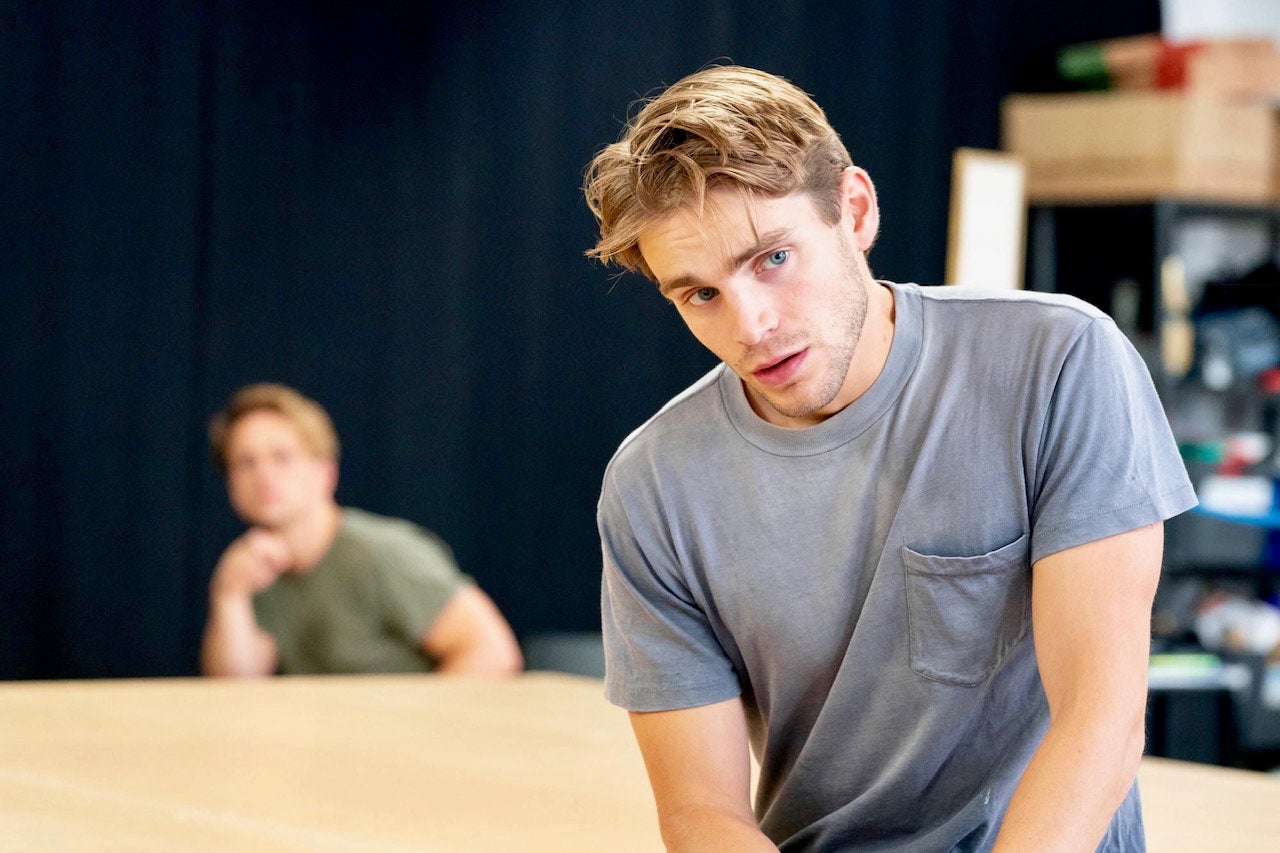
“I remember pulling over to the side of the road in L.A. and thinking, my life would change forever,” Burnap says. “And it has.”
Burnap speaks of The Inheritance with reverence. “Six hundred pages. I started reading it at 9:45 p.m. and read until 3 a.m., trying to stay quiet as I wept through the pages.”
The anecdote underscores one of Burnap’s favorite observations: “You have to go to the emotional space where the character has no choice but to be.”
It raises a question: Technique and practice as they apply to singing and dancing are concepts easily grasped. But what does it take to enter the interior world of a character? A teacher once told Burnap, “You don’t have to convince us that you are that person, you just have to convince us that you understand the experience.”
As a cisgender man playing a gay man in The Inheritance or a transgender alien from Transylvania in The Rocky Horror Picture Show, Burnap notes that the characters are signifiers meant to highlight some aspect of a shared human experience. “My job is to show you that I understand the experience,” he says. “I don’t know what it is to be a young, ostracized, gay man grappling with his sexuality, but I do know what it is to be viewed as ‘other,’ viewed as weird or not normal.”
And that’s an understanding requiring a lifetime of training.
“You have to become a keen observer of life. I was born with this wonderful and cruel capacity to feel,” Burnap says. “Acting makes you want to not only learn more about yourself, but, more importantly, about others. I get to forget my own complications, my own troubles and step into those of another.
“And every time I perform, I feel my soul and sense of humanity expanding more and more. Oh, my God, when you’re in the trenches of a thing but then float above yourself and say, ‘Holy shit, this is where I am!’ I am never tired of this, this gift of being able to create.”
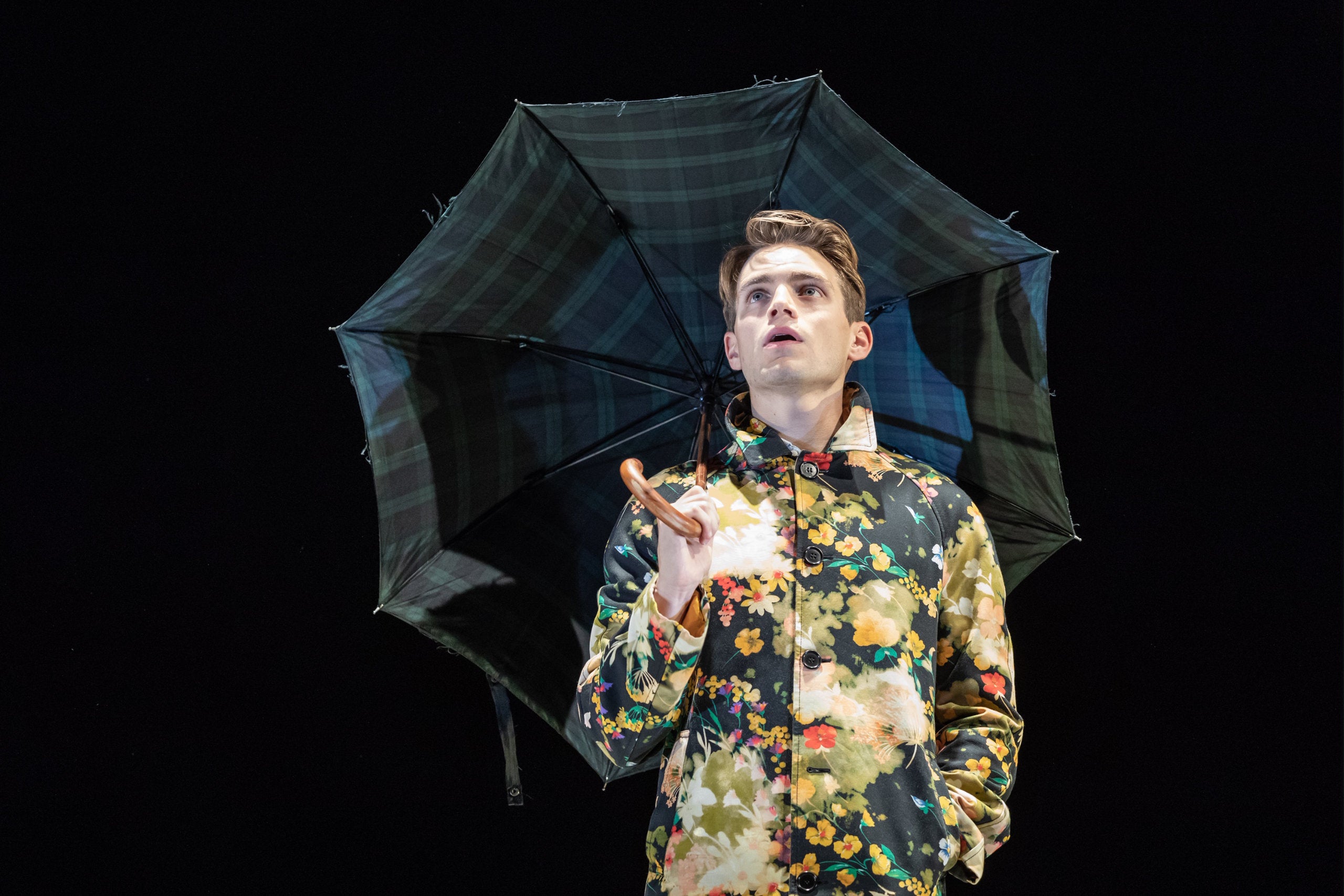
Burnap recites a line from his favorite novel, James Joyce’s A Portrait of the Artist as a Young Man: “Welcome, O life! I go to encounter for the millionth time the reality of experience and to forge in the smithy of my soul the uncreated conscience of my race.”
To those who aspire to a similar path, Burnap’s advice is a variation on Hamlet’s exhortation, “To thine own self be true”:
“Celebrate your oddities and your quirkiness: The things that make you remarkable are often your missteps, your perceived flaws, the things you hide,” Burnaps says. “Those are the things to celebrate, highlight, and foster.”
And his flaws?
“The things I’m trying to run away from,” Burnap says. “The things that are buried deep are truths everyone has, and the minute you grapple with those things — doors suddenly fly open. In the mission of revealing truth, in doing this soul-spelunking, you see what’s there.
“I’ve learned that when I grapple with uncomfortable truths within myself that more opportunities arise.”
One uncomfortable industry truth, the surety of rejection, prompts a second bit of advice and a circling back to Joyce’s A Portrait of the Artist: “If someone tells you, ‘No,’ ask, ‘Why not?’ Doubt is a useful thing, but it shouldn’t rule you. It should inform and maybe affect some of your decisions, but it should not be the resounding voice in your soul,” Burnap says. “Then ask, ‘Well, what else can I do?’ Because this quest isn’t easy, and it is filled with people telling you, ‘No.’ But if, in the smithy of your soul you feel you cannot do anything other than this, then do it — but know it requires that next level of dedication,” he says.
“And if you can start to understand that those things you didn’t get weren’t supposed to happen for you, you can understand the challenges of this business and go on.”
—Marybeth Reilly-McGreen
